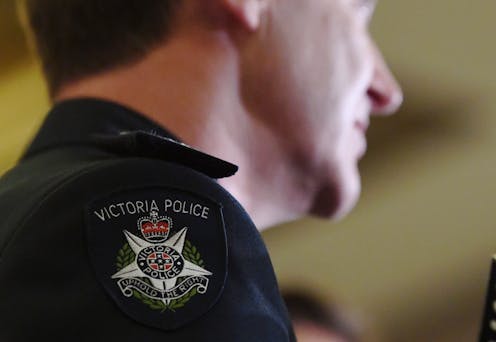Finally, police are taking family violence as seriously as terrorism
- Written by Jude McCulloch, Professor of Criminology, Monash University

Victoria Police recently announced that family violence perpetrators will be treated as seriously as terrorists and murderers.
This strategy represents a major milestone in the evolving police approach to family violence. Though family violence results in far more death and injury, terrorism is nonetheless considered Australia’s leading security threat.
The Victoria Police strategy represents an opportunity to reset security priorities by recognising family violence as the foremost contributor to the preventable death and injury of women and children.
Acknowledging family violence’s harms
Following in the footsteps of those who have noted the similarities between terrorism and family violence – using such terms as “intimate terrorism” and “everyday terrorism” to make this point – Victoria Police’s acting chief commissioner Shane Patton said:
… the consequences of family violence are the same as terrorism … We have death, we have serious trauma, we have serious injury and we have people impacted for the rest of their lives.
However, the scope of the harms of “everyday terrorism” are far more widespread.
Between 2002-03 and 2011-12, 488 women were killed across Australia in homicides perpetrated by their current or former partners. In the previous two decades, five people were killed in terrorist attacks in Australia.
In contrast, on average at least one woman is killed in Australia each week, usually by an intimate (ex-)partner.
Family violence is the leading preventable contributor to death, disability and illness in women aged 15–44. It is responsible for more disease burden than high blood pressure, smoking, and obesity.
Victoria Police research that informed its strategy indicates that in the past six years, more than 11,000 perpetrators harmed three or more victims.
In 2016-17, there has been 16 family violence killings in Victoria. This represents 28% of all homicides.
Shifting police practice
As the gatekeepers of the criminal justice system, police are critical in shaping the community understandings of crime. If the police don’t take a crime or threat seriously, it’s likely the public won’t either.
A few short decades ago, family violence was hidden, excused or trivialised.
Today, family violence, most typically intimate partner violence committed by men against their current or former partner, is recognised as the most prevalent type of violence against women. It is now also considered a serious crime and a pressing social issue. Changing police practices and priorities are central to this.
Until the 1980s, criminal assault in the home was, in police parlance, generally considered to be “just a domestic”. Those now labelled perpetrators of family violence were seen as having gone “a little too far with the missus”.
When women called police for help, officers either did not attend or did not intervene to protect the woman or arrest the perpetrator. Once a woman calls for help and does not receive it, or has the abuse trivialised or blamed on her actions, she is unlikely to call again.
Today, family violence is core police business. Across Australia, police receive a call related to family violence approximately every two minutes. Grim though these figures are, they reflect a major shift in police priorities and growing community recognition that they are a critical resource for those experiencing family violence.
Until the 1980s, Victoria Police, like most police forces at that time, was male-dominated and socially conservative. Women comprised a tiny fraction of the force, and police leadership was almost exclusively male.
Attitudes of police officers serving in this context often seemed to reflect and reinforce the notion of women as male property and at least partly responsible for the violence they experienced.
The new millennium marked a significant break in police tradition with the appointment of Christine Nixon as Australia’s first – and to date only – female police chief commissioner. She provided strong leadership around social inclusion and family violence.
In Nixon’s first year in office, Victoria Police published a violence against women strategy. In 2004, it developed a code of practice that required police to prioritise responding to family violence calls.
After Nixon left office, in another Australian-first, in 2015 Victoria Police established a Family Violence Command and appointed Dean McWhirter as assistant commissioner for family violence. The command aims to provide organisational and policy guidance and identify good practice.
What the change will mean
Family violence will now be investigated as major crimes by specialised units. Priorities will target repeat offenders and work to predict violence and intervene before women and children are injured or killed.
Perhaps just as important is the message the strategy sends about family violence as serious crime. Now, it really is everyone’s business.
The National Sexual Assault, Family & Domestic Violence Counselling Line – 1800 RESPECT (1800 737 732) – is available 24 hours a day, seven days a week for any Australian who has experienced, or is at risk of, family and domestic violence and/or sexual assault.
Authors: Jude McCulloch, Professor of Criminology, Monash University
Read more http://theconversation.com/finally-police-are-taking-family-violence-as-seriously-as-terrorism-88939





